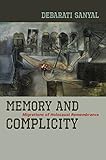Memory and Complicity : Migrations of Holocaust Remembrance / Debarati Sanyal.
Material type: TextPublisher: New York, NY : Fordham University Press, [2015]Copyright date: ©2015Description: 1 online resource (352 p.)Content type:
TextPublisher: New York, NY : Fordham University Press, [2015]Copyright date: ©2015Description: 1 online resource (352 p.)Content type: - 9780823265480
- 9780823265503
- Art -- Political aspects
- Collective memory -- France
- Collective memory -- French-speaking countries
- Colonization -- Social aspects
- Holocaust, Jewish (1939-1945) -- Historiography
- Holocaust, Jewish (1939-1945), in literature
- Holocaust, Jewish (1939-1945), in motion pictures
- Violence -- Social aspects
- HISTORY / Holocaust
- Algeria
- Allegory
- Memory
- complicity
- ethics
- france
- transculturual
- transnational
- trauma
- violence
- witness
- 840.9/358405318 23
- online - DeGruyter
- Issued also in print.
| Item type | Current library | Call number | URL | Status | Notes | Barcode | |
|---|---|---|---|---|---|---|---|
 eBook
eBook
|
Biblioteca "Angelicum" Pont. Univ. S.Tommaso d'Aquino Nuvola online | online - DeGruyter (Browse shelf(Opens below)) | Online access | Not for loan (Accesso limitato) | Accesso per gli utenti autorizzati / Access for authorized users | (dgr)9780823265503 |
Frontmatter -- Contents -- Acknowledgments -- Introduction: Pathways of Memory, Dangerous Intersections -- 1. A Soccer Match in Auschwitz: Passing Trauma in Holocaust Studies -- 2. Concentrationary Migrations in and around Albert Camus -- 3. Auschwitz as Allegory: From Night and Fog to Guantánamo Bay -- 4. Crabwalk History: Torture, Allegory, and Memory in Sartre -- 5. Reading Nazi Memory in Jonathan Littell's The Kindly Ones -- 6. Holocaust and Colonial Memory in the Age of Terror: Assia Djebar and Boualem Sansal -- Afterword -- Notes -- Index
restricted access online access with authorization star
http://purl.org/coar/access_right/c_16ec
Since World War II, French and Francophone literature and film have repeatedly sought not to singularize the Holocaust as the paradigm of historical trauma but rather to connect its memory with other memories of violence, namely that of colonialism. These works produced what Debarati Sanyal calls a "memory-in-complicity" attuned to the gray zones that implicate different regimes of violence across history as well as those of different subject positions such as victim, perpetrator, witness, and reader/spectator. Examining a range of works from Albert Camus, Primo Levi, Alain Resnais, and Jean-Paul Sartre to Jonathan Littell, Assia Djebar, Giorgio Agamben, and Boualem Sansal, Memory and Complicity develops an inquiry into the political force and ethical dangers of such implications, contrasting them with contemporary models for thinking about trauma and violence and offering an extended meditation on the role of aesthetic form, especially allegory, within acts of transhistorical remembrance. What are the political benefits and ethical risks of invoking the memory of one history in order to address another? What is the role of complicity in making these connections? How does complicity, rather than affect based discourses of trauma, shame and melancholy, open a critical engagement with the violence of history? What is it about literature and film that have made them such powerful vehicles for this kind of connective memory work?As it offers new readings of some of the most celebrated and controversial novelists, filmmakers, and playwrights from the French-speaking world, Memory and Complicity addresses these questions in order to reframe the way we think about historical memory and its political uses today.
Issued also in print.
Mode of access: Internet via World Wide Web.
In English.
Description based on online resource; title from PDF title page (publisher's Web site, viewed 02. Mrz 2022)


